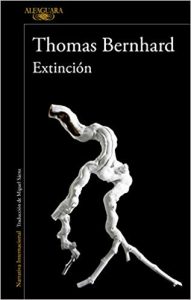Taking advantage of the recent award of the Nobel Prize for Literature 2019 to Peter Handke, today I bring up another great Austrian author who has already disappeared, Thomas Bernhard. A writer who stands out in the novel (in addition to many other creative aspects) due to the combination of the fictional with that always subjective realism (sometimes idealizing and at other times demeaning) of the autobiographical.
Novels with historical chronicle notes, plots loaded with satirical revision, always novel as a critic focused on the success of the vulgar or the mean (something recurrent in many authors but that conforms in Bernhard's imaginary that pessimistic construct also inherited from a childhood, let's say atypical)
Beyond his plays (I do not know if they have been performed again on any public stage, since Thomas Bernhard himself prohibited its representation as a bitter inheritance bequeathed to humanity), some of his most acclaimed novels are those that share an introspection in parallel between Bernhard's vital journey and the future of the world, a rich composition worthy of the recognition of a great literary work of the XNUMXth century.
Top Recommended Novels by Thomas Bernhard
The ill-fated
If there is a complex musical instrument, rich in nuances, emblematic and surrounded by its special paraphernalia, that is the piano.
On the keys of a piano you can spin notes for all emotions, from the darkest suspended chords to dramatization to the liveliest sequences that evoke joy. That all as a possible tool for the good pianist is this novel about two musicians united and separated by the same music even after one of them commits suicide.
The return of the surviving friend to the Austria they once shared fills him with emptiness, guilt, nostalgia and frustration. Because in reality there were three of them, a triangle between the virtuosity of the great pianist Glenn Gould, the blinding will of the deceased, Wertheimer, and the narrator's assumption of defeat. Nothingness loomed into the lives of Wertheimer and the narrator as Glenn Gould grew into a phenomenon at the piano.
And the vacuous attempts to overcome that emptiness, the impossible genius that is not available, is in tune with a frustration perhaps more internalized by the author, that of lucidity in the face of disenchantment, in that stark struggle that almost never ends well.
Extinction
It is always appreciated when new editions of works by great authors emerge. In this case Alfaguara reprises Bernhard's latest novel, a story with which the Austrian genius said goodbye in style to his particular setting.
A novel that focuses the universe on the small Austrian town of Wolfsegg. Because from there he was the protagonist of the story. A guy named Franz- Josef Murau who would like not to have to step back into that space that turned the memory of his childhood into a redoubt without oxygen, a suffocating evocation of that insurmountable childhood in which any childhood lived in the place would overshadow. The protagonist's sick hatred for that place must be ignored to face the farewell of his entire family. The fatal outcome of a traffic accident further darkens memories.
And yet, in fatality there can be reconciliation. But only someone like Bernhard can teach us it, but not before going through all the hells to which fear leads. In the end, you discover that intuition of the few hours someone has left to write more stories.
And to top it all off, the author seems to want to make us smile when we look for acid sarcasm in his work. The narrative takes on very special nuances between the metalinguistic and the metaphysical, reaching at its end a brilliant extinction like a macabre joke.
Concrete
Another of the works recovered by Alfaguara. One of the shortest compositions of the author. Once again we enter the labyrinths of obsessions, of those drives that repeatedly push the human spirit.
And nothing better to stage these tendencies of reason than the characterization of an erudite music scholar with his particular fixation on the German composer Mendelssohn. Nothing distances him from his intention to occupy the soul of the musician, assaulting it from his notes, reaching some shared space in which he can dialogue with him through the legacy of his work.
With that subtle touch of corrosive humor, we accompany a Rudolf who lives between his sister's snubs for his lack of understanding and an intellectual assignment about Mendelssohn that has not even begun.
Under a new light of Mallorca, in which Rudolf longs to channel his own inner light. Until something new crosses his path, a new fixation on a woman whose strange memory ends up leading him to a cemetery where he now resides.
The metaphor of concrete as a title closes at the end of the brief but intense story, between soliloquies in which Rudolf fruitfully reviews his messianic and absurd vision of the world. And there, in front of the concrete with which the mausoleums are built, the circle of a sinister allegory about will and nothingness closes.




Good Francisco:
I started reading Thomas Bernhard a couple of months ago. It is a deep and very interesting journey, which is definitely worth undertaking.
As a certain bookseller (a reader of Bernhard for years) explained to me at the time, starting with the Pentalogy may not be the best option. Not because it is not interesting, far from it, but because Bernhard is an author who is better to go into little by little, to enjoy it to the fullest.
From this position, the recommendation he made me was to start with "Ancient Masters", a novel in which he touches most of the themes of his works, in addition to his characteristic narrative style, which I have not yet found in any other author.
You will be able to find the synopsis on the internet without problems but, to leave you with a bit of curiosity, just tell you that it is about a musicologist, Reger, who has been going to the same museum room every other day for 36 years, always sitting in front of «The man with the white beard ”, by Tintoretto. Through the internal monologue of the narrator (protagonist, Atzbacher) he gradually reveals Reger's life, interspersed with the conversations he has had with him over time, and the real reason why he continues with this routine, 36 years later.
I hope this helps you,
regards
I have met Thomas Bernhard on a national radio show where they were talking about his theatrical performance of the ignorant and the beggar. I really enjoyed hearing about his life and that he was greatly influenced by his grandfather.
To learn more about him, they recommended his pentalogy, autobiographical accounts, a book that I find out of print everywhere and not available to buy used.
I have not read anything of his yet, but only with what I heard has already aroused my greatest curiosity. If there are any readers of Thomas Bernhard, I would appreciate writing something. Thanks.
regards
Good Francisco:
I started reading Bernhard a couple of months ago, and it is certainly a profound and impressive journey.
However, as a bookseller who has been reading it for years told me, starting with the Pentalogy may not be the best option. Not because it is not interesting, far from it, but because Bernhard is an author who is recommended to discover little by little.
From that position, the reading that I was recommended (and without a doubt I recommend) to begin with was "Old Masters." I believe that, in this novel, Bernhard's narrative style is perfectly glimpsed (a style that I have not found, yet, in any other author), and deals with the main themes of the rest of his works.
You will be able to find the synopsis online without any problems but, to leave you with some curiosity, just tell you that it is about a musicologist (Reger) who has spent 36 years going to the same museum room on alternate days, always sitting in front of the «Man with the beard blanca ”by Tintoretto. The entire work revolves around the protagonist's inner monologue, added to the experiences he has heard throughout Reger's time.
I hope it helps you a bit as a guide,
regards